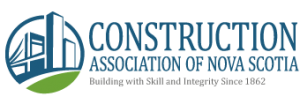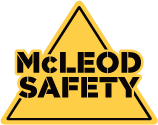CANS Feature: What’s Your Safety Standard? (by McLeod Safety)
Jake Takes On Safety – What’s Your Safety Standard?
Submitted by: Jake Siegner, CRSP (Safety Manager, McLeod Safety)
Looking across the table at me was a pretty intimidating gent who appeared to be the walking definition of “Intimidating Biker.” A big brute of a fellow with tattoos on his knuckles, a beard that the members of ZZ Top would admire, and a voice that could shake the building when he was mad.
We were in a meeting held as a result of several safety incidents that had occurred in quick succession, and I’ll never forget what he said. He was a Site Superintendent working for the Prime Contractor that oversaw my company. What he had noticed was Safety working our collective butts off to prevent incidents, but our Supervision didn’t appear on the surface to be supporting us.
The gist of what he said to our Supervision, in the presence of our Management, was “your lowest standard, is their highest standard.”
What he saw was our field Supervision; definitely, some but not all seeming to pay lip service to safety but not walking the walk. He noted that some field Supervision, (this would be General Foremen, Foremen, and even Site Superintendents) talked a lot about safety in meetings each day, but when it came down to it, production seemed to be top priority. What he was saying is that if you have low standards for safety, then those who work under you will see that low standard as THE standard. I’ll admit that I was kind of surprised to hear this from him but, I guess it once again proves the old adage, you can’t judge a book by its cover.
Managers and Supervisers overseeing projects must be seen and heard talking about safety, supporting the safety person and participating directly in safety. This must be consistent, genuine, and unwavering…even in the face of challenges due to production. Especially in the face of production challenges!
Over the years, I’ve worked with some amazing field supervision that taught me a lot about the different trades, production, processes and safety. During these same years, I’ve worked for some absolutely terrible ones, and there’s something consistent I noticed about the terrible ones — not all of them, but a fair number. Some of the terrible ones have the highest production levels, and high incident rates to match! The goals of completing a construction project on time and on budget while doing it safely are not mutually exclusive; they can exist in the same space.
What do I mean when I say terrible? Backstabbing safety whenever they are not around. You know, the ones that refer to safety as the “Stop Work Department” and take every opportunity to bad mouth safety to anyone who will listen, especially the tradespeople working under them. These are the ones who will disagree with you in safety meetings instead of taking something offline. They will say things in front of their crews like “okay Mr. Safety, how do you want us to do it?” It might not be you, but these folks exist. I know this to be certain because of how many times I and my colleagues have had interactions with them. And when we don’t hear it directly from them, we hear it from the tradespeople onsite. It almost always gets back to us.
Look, let’s face it. Safety and production will always be at odds with each other until we all figure out a way to work together. They should never outpace each other, but rather they need to work as equals and as partners. There needs to be excellent communications both ways and management, and supervision need to get safety involved before something happens, not after or while it’s happening.
Why do safety folks sometimes get the reputation as the “Stop Work Department?” Which of the two scenarios do you think leads to this way of thinking and who do you think is the one perpetuating this way of thinking? In the first scenario, a crew will need to access a roof, so it is brought up to safety a few weeks or days before to develop a plan. In the second scenario, safety is not consulted ahead of time; safety arrives for a site inspection and sees an issue with access to the roof. The job is already underway when they discover the issue, so they bring it to the attention of the Superintendent. The Superintendent gets really upset in front of all the crew; they put you on the spot to immediately come up with a solution on your own because theirs is “the safest way to do it!!” but in the meantime, the task needs to be stopped until the problem is rectified.
Of course, it’s the second scenario. It plays out every day in construction. Lots of planning may have gone into the task, but no one thought to involve safety. The folks in charge went with the lower standard, and that’s what the crew sees first. Then, they get an extra dose of “those safety people don’t have a clue!!” for anyone that will listen. This kind of toxic relationship between safety and supervision leads to a decline in the safety culture of your sites. But it doesn’t have to.
I’ve been around construction long enough to know not everything can be planned for, but I’ve been in plenty of situations in which it wouldn’t take a rocket scientist to figure out that clearly planning has gone into the task or job. Safety should be involved in the planning phase of many different tasks, to what degree and how that works can be determined at the Management level.
Take it offline. Now obviously it would be unrealistic to think everyone will get along and be happy working together all the time, but as far as the crew goes, safety and supervision need to appear to be best friends. Fight like crazy behind closed doors all you want, but when you go out solo or together, you’re a team. Back each other up no matter what and if you can’t, then don’t say anything at all. Work it out when the field crew is not around. Never argue, disagree or fight about safety vs. production in front of tradespeople. Neither safety nor supervision will win, but everyone will look bad in someone’s eyes.
The same goes for Management to Supervision when it comes to safety. When it comes to safety, never argue, disagree, or contradict supervision in front of lower ranks. As management, your support for safety must be unwavering, or else as my rather intimidating, burly friend in supervision who drove this point home so eloquently will tell you, a low safety standard will become your field supervision’s high standard. In private, disagree, argue, and whatever else you need to do so that when you leave that room, everyone is on the same message when it comes to safety.
There have been plenty of times in my career that I’ve had to pull someone aside after a meeting and say I disagree with something they’ve said and here’s why. I’ve even had to point out a few times when people in meetings or elsewhere were just given incorrect safety information. Sometimes we correct it on the spot, other times we wait, but it is corrected. Each situation is different. This can be done without making the other person look bad or appear you’re in disagreement.
Ultimately our goal should always be two-fold: high production in conjunction with high standards of safety. This may strike some as a lofty, or even impossible goal, but I wholeheartedly believe that it is an attainable one. When safety and production are in balance, safety can actually help production, but that’s a topic for another day.
About McLeod Safety:
McLeod Safety began as Colchester Security in 1988 and continued to operate under that name until 2001 when Ron McLeod purchased the company and changed the name to McLeod Safety. In 1988 we started with two vehicles and a handful of staff, today we have over 300 employees and a large fleet of fully equipped vehicles and traffic control equipment allowing us to provide our customers throughout Nova Scotia, New Brunswick, and Prince Edward Island with the safety services and products they need at competitive prices.
While our focus has been on providing our customers with exceptional and dependable traffic control services, we have also grown to include an industrial safety supply store, sales and rental division for traffic control products, and a sign shop where we have the capability to service both small and large construction and custom sign orders.
Website: https://www.mcleodsafety.com/

